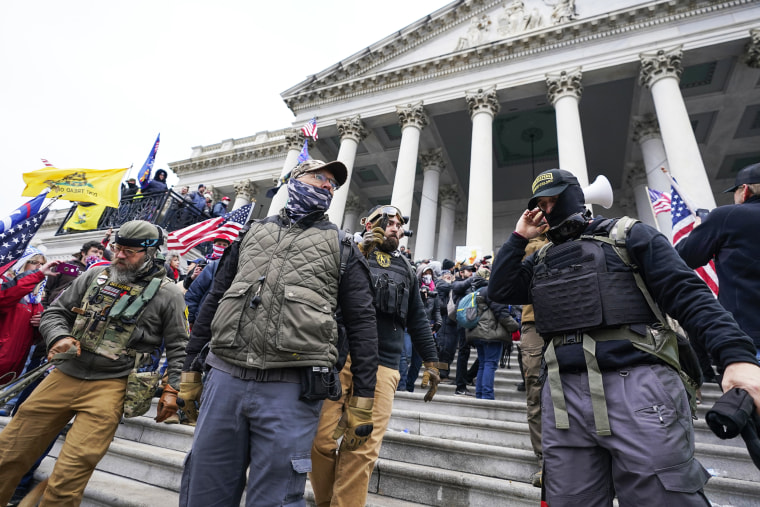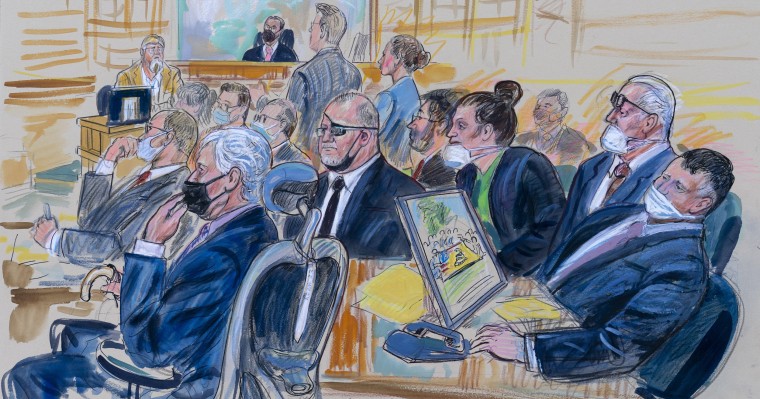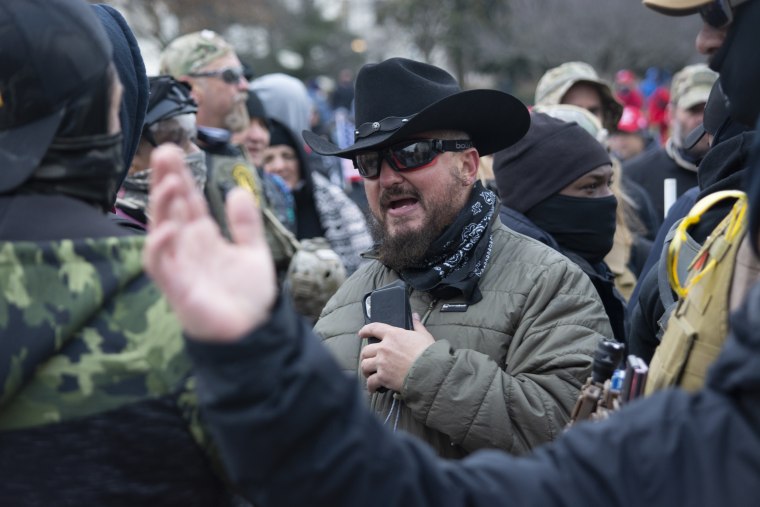WASHINGTON — Members of the far-right Oath Keepers organization seized the opportunity to storm the U.S. Capitol on Jan. 6 as part of a broader criminal conspiracy to oppose the peaceful transfer of power, a Justice Department prosecutor told jurors during closing arguments in their seditious conspiracy trial on Friday.
“For these defendants, the attack on the Capitol was a means to an end,” Assistant U.S. Attorney Kathryn Rakoczy told jurors. The defendants were driven by a “sense of entitlement that led to frustration followed by rage and then violence,” Rakoczy said.
Oath Keepers founder Stewart Rhodes and four others affiliated with the far-right organization are facing charges of seditious conspiracy, a rarely used statute that makes it unlawful to conspire against the authority of the government.
Over the course of a seven-week trial which began with opening arguments on Oct. 3, jurors heard violent rhetoric aimed at Democrats and the group's desire to keep former President Donald Trump in office. Prosecutors did not present evidence that there was a pre-formed plan to storm the Capitol but argued that the alleged co-conspirators entered into an agreement to oppose the transfer of power from Trump to President Joe Biden.
Closing arguments are expected to continue into Monday when the jury will begin deliberating their verdict. Rhodes testified during the trial, as did co-defendants Thomas Caldwell and Jessica Watkins. Kelly Meggs and Kenneth Harrelson did not take the stand.
Prosecutors relied on testimony from Jason Dolan and Graydon Young as well as Terry Cummings, who told jurors that the group stored guns at a Virginia hotel as part of a "quick reaction force" (QRF) that Cummings said featured more weapons than he'd seen since he was in the U.S. military.
James Lee Bright, an attorney for Rhodes, repeatedly told the jury that the government has presented no evidence to back up what he called “The Big 3”: "No plan to storm the Capitol. No plan to breach the rotunda. No plan to stop the certification or delay the certification of the election."

Bright told jurors there was not evidence of a "meeting of the minds" on seditious conspiracy.
“We’ve had 50 witnesses in this case, not one person has testified to you there was a plan,” Bright said. “Not one.”
If Rhodes truly wanted to take over the Capitol, Bright argued, he would have called in the QRF after the building's doors were breached and sent in some of his best fighters, like Michael Greene, he said.
“You’re either the Keystone Cops of insurrectionists or there was no insurrection,” Bright said.
Oath Keepers were upset about the results of the 2020 election, but them venting their frustrations to each other doesn’t constitute a conspiracy, Bright argued.
“It was heated rhetoric,” he said. “Horribly heated rhetoric. Bombast. Inappropriate. But that is not indicative of an agreement.”

Rakoczy, arguing for the government, reminded jurors that Rhodes had started talking about civil war just after the 2020 election.
“‘We are not getting through this without a civil war. Prepare your mind body and spirit’ — those were the words of Stewart Rhodes on November 5, 2020, two days after the presidential election,” she said. “Defendant Rhodes called for war with all of its horrors and all of its violence to oppose the results of a presidential election.”
Evidence showed that the defendants agreed to "use any means necessary, up to and including force, to stop the lawful transfer of presidential power,” she said. “That is a conspiracy.”
The attack on the Capitol on Jan. 6 was just a “means to an end” in support of their larger goal of overturning the election results and stopping Joe Biden from becoming president, she argued.
“Mr. Rhodes told you in his own words he was prepared to start a rebellion the day that president Biden took office,” Rakoczy said, referring back to Rhodes’ testimony in his own defense.
Rakoczy also focused on calls for violence and rebellion in messages sent by the defendants, saying, “that’s just what they put in writing.” The defendants surely discussed more precise plans over the phone and during in-person meetings, she said.
About 900 people have been arrested in connection with the Jan. 6 attack on the U.S. Capitol, and hundreds more arrests are in the works.

